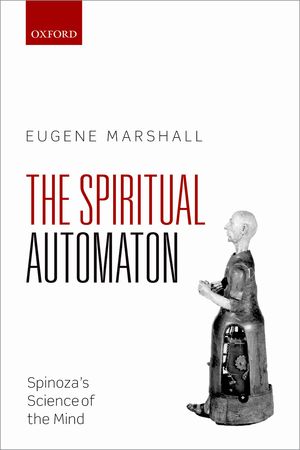Eugene Marshall, The Spiritual Automaton
 Dit boek, waarvan ik de komst in een blog van 6 september 2013 signaleerde, is inmiddels begin dit jaar uitgekomen:
Dit boek, waarvan ik de komst in een blog van 6 september 2013 signaleerde, is inmiddels begin dit jaar uitgekomen:
Eugene Marshall, The Spiritual Automaton: Spinoza's Science of the Mind. Oxford University Press, 2014 - books.google
Tabel of Content - TOC
1: Introduction and Background
2: Adequate Ideas are Innate
3: Power, Conatus, and Affects
4: Affects and Consciousness
5: Moral psychology and bondage
6: Freedom, therapy, and salvation
Bibliography
Index
Er bestaan niet veel studie over Spinoza's theorie over de geest/het mentale. Vandaar dat ik er hier weer eens apart op wijs. Ik heb zelf (ondanks dat ik al aardig wat blogs over dit onderwerp had) nog steeds wel behoefte aan een goede inleiding, waarin ook de relevante secundaire literatuur wordt meegenomen. Dat lijkt me via wat Google laat zien, redelijk het geval. Toch denk ik wel dat ik nog even wacht op de komst van de paperback.
En omdat het een beter beeld van de inhoud kan geven, geef ik hieronder de meer gedetailleerde TOC:
1. Introduction and Background
I. General Introduction 2. Background [2.1. Ideas 2.2.
Inadequate Ideas 2.3. Inadequate Ideas, Essences, and Representation]
3. Conclusion of the Introduction
2. Adequate Ideas are Innate
1. Introduction 2. The Challenge 3. Adequacy [3.1. The Common
Notions 3.2. God's Essence 3.3. Particular Essences] 4. Innateness
[4.1. Skepticism Concerning Innateness in Spinoza 4.2. Leibniz and
Spinoza on Innateness] 5. Conclusion
3. Power, Conatus, and Affects
1. Introduction 2. Power of Acting [2.1. Modes of Substance
and the Power of Acting 2.2. On Complex Individuals 2.3. Ideas and
Power] 3. Conatus [3.1. A Tendency to Persevere 3.2. The Tendency in
Complex Individuals] 4. Affects of the Minds. 5. Adequate Ideas and
Active Affects [5.1. Rejecting the Human Inadequacy Argument 5.2.
Being an Adequate Cause 5.3. Adequacy and Explanation] 6. Conclusion
4. Affects and Consciousness
1. Introduction [1.1. A Note on Consciousness Terms in Spinoza]
2. Competing Theories [2.1. Ideas of Ideas 2.2. Complexity 2.3. The
Power of an Idea] 3. A Theory of Consciousness in Spinoza [3.1. What
Would a Good Account of Consciousness Look Like? 3.2. Consciousness
as Affectivity 3.3. More Than Just Emotions 3.4. The Richness of
Affectivity 3.5. Consciousness and Desire 3.6. Affectivity and the
Ethical Project] 4. Objections [4.1. Avoiding Old Objections 4.2.
Addressing New Concerns 4.3. An Evaluation and Summary of the
Interpretation] 5. Conclusion
5.
Moral Psychology and Bondage
I. Introduction 2.
Bondage and Freedom [2.1. Two Senses of Freedom 2.2. Freedom and
Action 2.3. Freedom and Living According to Reason 2.4. A Few
Conclusions So Far] 3. The Mechanisms of Bondage [3.1. The Illusion
of Free Will 3.2. Affects and Akrasia 3.3. Mind as Affective
Mechanism 3.4- Akrasia in Spinoza 3.5. The Mechanisms of Bondage and
Akrasia] 4. Conclusion
6. Freedom, Therapy, and
Salvation
I. Introduction 2. The Affective Mechanisms of
Freedom [2.1. The Mechanisms of Freedom 2.2. Further Mechanisms] 3.
Blessedness, Salvation, and the Soul [3.1. Our Highest Happiness and
Blessedness 3.2. Faith and Salvation 3.3. Consciousness and the
Eternity of the Soul] 4. Final Conclusions
Bibliography Index
Eugene Marshall's Twitterpagina


Reacties
Dit boek schept voor mij hoge verwachtingen en ik ga het direct aanschaffen.
henk keizer 24-03-2014 @ 19:29
De titel is minder onheilspellend dan hij lijkt. In TEI zegt Spinoza dat de geest, geleid door ware ideeën, is als een 'automata spirituale', d.w.z. als een zichzelf onderhoudend mechanisme. Ware ideeën volgen elkaar op volgens bepaalde wetten. Dat maakt de geest, voor zover gevormd door ware ideeën, tot een 'self-directed' systeem (spiritual automaton).
henk keizer 28-03-2014 @ 17:00
Gisteren gaf Eugene Marshall op the Mod Squad "abstract and table of contents" van zijn boek.
http://philosophymodsquad.wordpress.com/2014/05/06/another-new-spinoza-book/
Stan Verdult 07-05-2014 @ 10:57
Karel D'huyvetters heeft een uitgebreide en interessante kritische bespreking van het boek van Eugene Marshall.
http://blog.seniorennet.be/spinoza_in_vlaanderen/archief.php?ID=1604687
Stan Verdult 30-05-2014 @ 12:12